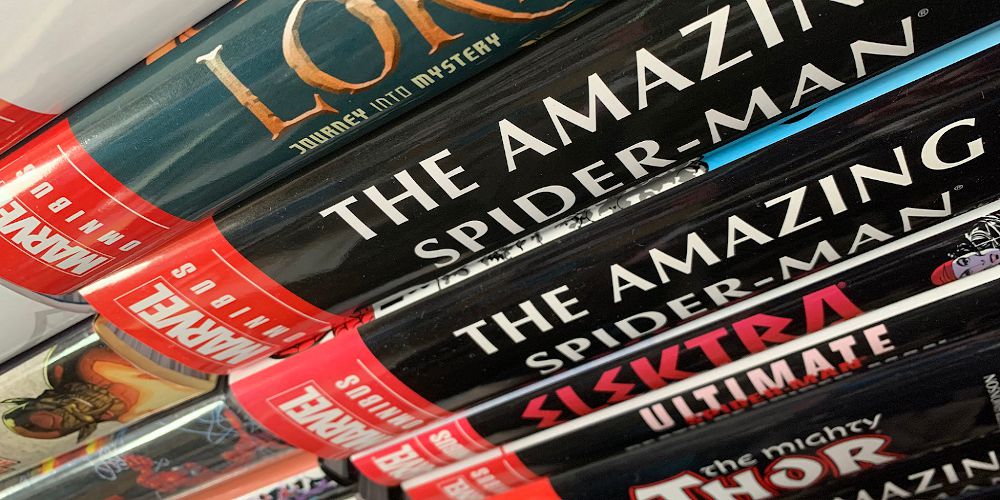
Are you starting your own graphic novel collection? Here's a glossary of comic book terms you need to know.
Jun 19, 2020
If you buy something using our links, we may earn a commission at no extra cost to you. Thanks for your support!
Anyone can start a graphic novel collection. But it helps if you know what you're talking about. Start your journey with this glossary of essential terms.
This isn't a guide to the terminology used in comics, per se: you need to already recognize the difference between comics and graphic novels. It's intended solely for collectors intent on building a library.
#0/Zero issues: A story set before #1 of a series, acting as a prelude.
Absolute: Large, high-quality HC collections released by DC, complete with dustjackets and slipcases. Alongside fully remastered issues, volumes often include supplementary material including character designs, scripts, and sketch reprints.
Artifact Edition: A collection of pages from one artist but differing storylines, reprinted from scans of original artwork. These allow you to see linework, collages, and errors clearly.
Artist's Edition: A HC collection of comics with sewn binding, comprising a whole storyline. Though published by IDW, volumes span different publishers. Each measure 12" x 17" or 15" x 22", reprinting pages at their full sizes.
Artisan Edition: These are similar to IDW's Artist's Editions, but are cheaper TPBs with glued bindings, and measure 8" x 12".
Backing boards: Cardboard sheets used to stop comics bending. Make sure these are acid-free or you risk damaging your comics.
Big Two: Refers to the two biggest comic book publishers, Marvel and DC.
CGC: The Certified Guaranty Company is the best-known comic grading company. Members across the world send issues to the CGC's HQ in Florida to get their condition's judged. Comics are sealed in protective holders with color-based labels and a number on a grading scale from 0.5 to 10.
CGC also grades magazines, movie posters, and related collectibles, plus offers an autograph authentication service.
Comic bags: Plastic wallets to store comics in. These are made from either Polypropylene, Mylar, or Polyethylene. The latter is the cheapest and so used by many dealers, despite their propensity to yellow.
Polypropylene lasts longer, but still need to be changed every 10 years or so, whereas Mylar, in most cases, won't need replacing at all.
DC Archive Editions: DC's version of the Marvel Masterworks launched in 1989, with HC volumes reprinting restored issues from the 1930s- 1960s.
Deluxe Edition: A thick hardcover or paperback collection of comics, although it's sometimes used to describe omnibuses and Absolute editions too.
Digest: A paperback which is smaller in height and length than a typical TPB. Manga is generally this size, but American publishers also experiment with it; notably, Marvel's Runaways owes its success to the digest format.
Epic Collection: A series of high-quality full-color reprints, aiming to publish every main comic series from their beginnings to the late-1990s. These aren't printed in order, so, for example, Daredevil Volume 13 (A Touch of Typhoid) was released before Volume 1 (The Man Without Fear).
Floppies: Refers to single issues. Rarely used professionally, for obvious reasons.
Glued binding/spine: Pages are bound using glue, which often means a narrow gutter and bent spines after reading. Pages are prone to falling out. Most TPBs use this method.
Grab bags: A mix of issues, sometimes from different publishers, bagged together and sold at a discount price.
Gutter: This can describe the space between panels; however, "gutter loss" is also a question of how much content can't be seen due to potentially tight bindings.
HB/HC: Respectively short for "hardback" and "hardcover", although these terms are interchangeable.
Incentive covers: A variant cover stores receive after ordering x copies of a comic. Some are conservative at 10; others require 1000 copies of an individual comic to be ordered to get one variant cover. These mean independent stores can't compete with big chains.
Indie: Short for "independent", referring to a smaller publisher unconnected with industry leaders.
Marvel Masterworks: HCs and TPBs collecting remastered Marvel/Atlas comics from the 1930s- 1970s. The line launched in 1987, each volume featuring around 10 issues.
Maxiseries: A limited series, which runs longer than a miniseries. These often last for 12 or 13 issues, a full publishing year.
Miniseries: A limited series designed to end after a specific issue (as opposed to "Ongoing"). These generally consist of around 6 issues.
OGN: Short for "original graphic novel". Whereas many graphic novels collect previously-printed storylines, OGNs consist of material made specially for this release. Notable examples include the Asterix range, Marvel's The Death of Captain Marvel and X-Men: God Loves, Man Kills, and the Pulitzer Prize-winning Maus.
Omnibus: A thick HC volume, often collecting together a whole run by a creative team.
The smallest of these comprise around 300- 400 pages (like 2016's The Superior Foes of Spider-Man, including 17 issues); while the largest are well over 1,000 pages. Marvel's Deadpool by Posehn & Duggan Omnibus (2016) is 1,360 pages, comprised of 53 issues, and DC's thickest, Batman: The Arkham Saga Omnibus (2018), also 53 issues, weighs in at 1,648 pages.
Ongoing: A series intended to run continuously for a number of years. Many do so, albeit going through various relaunches and reboots, although far more are eventually cancelled. These include Walt Disney's Comics and Stories, 2000AD, and Action Comics.
Poly bags: An alternative name for comic bags.
Sewn binding/spine: Groups of pages are stapled together, then bound using fabric to form a stronger spine. These are more expensive, so are sometimes used in omnibuses or large HCs.
TPB: "Trade paperback", a standard-sized paperback graphic novel, sometimes called a "trade". These generally collect together one complete storyline, potentially plus one-shots, so can be anywhere between 4 and 12 issues.
Variants: Covers released with different artwork from a standard release. Many popular titles have numerous variant covers, especially milestones, to encourage readers to collect a complete set.